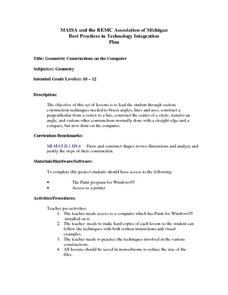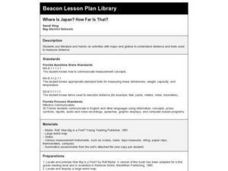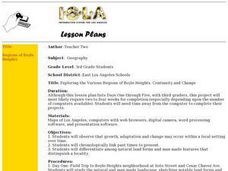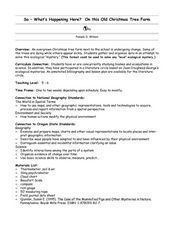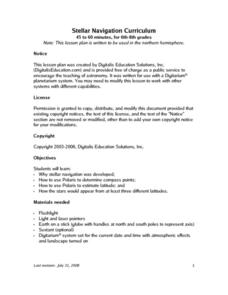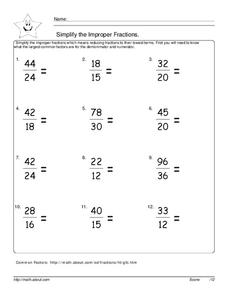Curated OER
Scenic Attractions In Four Corners
Fourth graders find and list scenic attractions in SE Utah and the Four-Corners-region. They receive direct instruction and carry out activities in cooperative group settings. They combine their findings onto one large map at the end of...
Curated OER
Best Practices in Technology Integration
Students go through various construction techniques needed to bisect angles, lines and arcs, construct a perpendicular from a vertex to a line, construct the center of a circle, transfer an angle, and various other constructions normally...
Curated OER
Magnets
Students explore the many uses of magnets. in a compass, an alarm, salvage yard equipment to lift tons of metals.
Curated OER
Flying High With Hot Air Balloons!
Sixth graders demonstrate an understanding of a narrative story by listening, speaking, reading and writing activities. They create two visual products that reflect the understanding of events, vocabulary, and characters.
Curated OER
Where Is Japan? How Far Is That?
First graders use literature and hands-on activities with maps and globes to explain distance and tools used to measure distance. They select tools to measure various objects in the classroom, then apply those concepts to their map...
Curated OER
Outline Map of Japan
In this geography learning exercise, students examine a black line outline map of Japan. There is a compass rose on the page. There are no labeled cities.
Curated OER
Making a Mountain Out of a Snow Hill: Skiing, Winter Sports, Economics, Business, Problem Solving
Pupils explore how to select among choices of variables and analyze the cost-benefit ratio of their short and long term planning in a team activity as they consider the planning and operation of a ski slope.
Curated OER
Exploring the Various Regions of Boyle Heights: Continuity and Change
Student study the local landscape of Boyle Heights, California and draw a sketch of the area. Students use map making skills in this activity. Studient make a portfolio of information and photographs they accumulate over time on the area.
Curated OER
Cartography
Students research about cartography and how to be a cartographer. In this math lesson, students draw a map of their classroom. They use a robot to explore navigation using a compass rose.
Curated OER
Making a Region Map of a State
Fourth graders create salt maps of a state and indicate its regions. They include topographical elements including mountains, valleys, lowlands and major water bodies and a compass rose.
Curated OER
So -- What's Happening Here? On this Old Christmas Tree Farm
Students take a field trip to an old Christmas tree farm near their school. In groups, they gather data at the site and analyze the data in an attempt to discover what happened to the area. They identify human activities that led to the...
Curated OER
Navigating Your Community
Students draw a map from memory describing the route between their classroom and the gym including a legend, a compass rose, a map scale, symbols, and a landmark at every change of direction. They then retrace their steps in their maps...
Curated OER
Stellar Navigation Curriculum
Middle schoolers investigate the concept of star mapping and how it is used in space navigation. They conduct various activities to see the effect of mapping. Also the teacher uses models and demonstrations in order to communicate the...
Curated OER
Simple Machines make work easier.
Students examine how simple machine work can make work easier. In this machines lesson plan students complete an activity that shows them what makes up a machine, and how to measure displacement and velocity.
Curated OER
What Shape Is It?
Pupils predict the shape of an unknown object by bouncing a ball on it. In this physics lesson plan, students relate this activity to how dolphins use echo-location to navigate. They analyze their lab result and discuss findings.
Curated OER
Outdoor Education
Students participate in various outdoor activities to teach them about the environment. In this outdoor education lesson plan, students participate in activities such as compass direction, conservation, forestry, wildlife, and...
Curated OER
Exploring Magnetism
Twelfth graders experiment with magnets in order to visualize that magnets have a north and south pole, some materials can be magnetized, and magnetization occurs because of the magnetic moments of individual molecules in matter.
Curated OER
Classify and Measure the Angles
In this angles worksheet, students classify and measure 2 given angles, using a compass to determine the angle within 5 degrees. Worksheet is part of a resource directory site with links to many additional activities.
NorthEast Ohio Geoscience Education Outreach
Earth, Sun and You
Middle schoolers model Earth's revolution round the sun by walking a mini-globe around a lamp. You will assess whether or not they tilt and rotate the planet properly and that the revolution is counterclockwise. Discussion beforehand...
Texas Instruments
Copying an Angle
High schoolers will investigate geometric construction in this geometry lesson. Your pupils can explore the basic construction of copying an angle, using the constructions tools of Cabri Jr.
Curated OER
Properties of the Ocean: Change
Students research and create a visual presentation on the seasonal salinity of the Earth's oceans. They apply the research in a simulation of a lab disaster in which they must relabel ocean samples.
Curated OER
Mandalas, Polygons and Symmetry
Students create a geometric pattern using mandalas, polygons and symmetry. In this geometry lesson, students analyze the mathematics involved in making the mandalas, including the shapes and symmetry. Students create their own mandalas...
Curated OER
As the World Turns: The Coriolis Effect: Global Wind Patterns, Earth's Rotation
Students use pencil and paper to explore the Coriolis effect and how the Earth's rotation causes global wind patterns.
Curated OER
Adding Colors
Students investigate the combination of colors created by the human eye. The lesson highlights the eye's ability to retain the individual colors and add them together to produce a third when the colors are spun.

